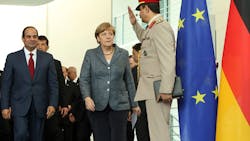Siemens Deal, Protests as Merkel Welcomes Egypt's Sisi
German Chancellor Angela Merkel on Wednesday welcomed Egyptian President Abdel Fattah al-Sisi, whose controversial Berlin visit was met by human rights protests but crowned by a multi-billion-euro energy deal.
German engineering titan Siemens signed its largest-ever order, worth 8.0 billion euros ($9.0 billion) and centered on natural gas and wind power plants, that it said would boost the North African country's power generation by 50%.
Merkel in a joint press conference with Sisi voiced criticism of Egypt's use of the death penalty and record on religious freedom, but pledged closer economic ties with its partner in the fight against Islamic extremism.
She stressed the central role of Egypt in a conflict-torn region, referring to the Islamic State jihadist group fighting in Iraq and Syria, instability in Libya and Nigeria's Boko Haram militants.
"Egypt is one of the central countries in a region marked by unrest and instability," the chancellor said, adding that closer business links would help bring "stability through economic development".
Sisi was greeted with military honors by the government, but also angry protests on the streets and at the news conference.
At the end of the media briefing, a woman wearing a head scarf shouted at Sisi and called him a "murderer", leading many Egyptian journalists to defend the president and shout "long live Egypt", as both Sisi and Merkel were led out of the tumult by security guards.
Sisi, Egypt's former army chief, ousted Islamist president Mohamed Morsi in July 2013 and launched a deadly crackdown against his Muslim Brotherhood supporters as well as secular activists.
The campaign left hundreds of Morsi supporters dead and thousands jailed, while dozens have been sentenced to death in mass trials, including Morsi himself who is awaiting a final ruling on his sentence.
Criticism for Death Sentences
Merkel said Germany always opposes capital punishment and that "under no circumstances, even with regard to terrorist activities, must people be sentenced to death", while also stressing the need for continued bilateral dialog.
German parliament speaker Norbert Lammert had earlier called off a meeting with Sisi citing the "systematic persecution of opposition groups with mass arrests, convictions to lengthy prison terms and an incredible number of death sentences".
Five prominent rights groups, including Amnesty International and Human Rights Watch, on Monday urged Merkel to press Sisi to end "the gravest human rights crisis in Egypt in decades".
Sisi insisted Egypt's justice system was independent and fair, and that many of the death sentences including Morsi's were still subject to judicial review.
"We too love democracy and freedom", he said, but said that his country must avoid the chaos seen in Syria, Yemen, Libya and Iraq, vowing that "we cannot allow this".
The Egyptian leader during his two-day visit also met President Joachim Gauck, Vice Chancellor Sigmar Gabriel and Foreign Minister Frank-Walter Steinmeier.
At a business conference, Sisi witnessed the signing of the deal with Siemens for gas and wind energy facilities with a capacity of 16.4 gigawatts.
The deal was based on memorandums of understanding announced in March 2015.
Siemens said it would build three natural gas-fired combined cycle power plants, which it said would be "the largest in the world" and up to 12 wind farms in the Gulf of Suez and West Nile areas, comprising around 600 wind turbines.
It would also set up a rotor blade manufacturing facility, which would provide training and jobs for up to 1,000 people.
"With these unprecedented contracts, Siemens and its partners are supporting Egypt's economic development by using highly efficient natural gas and renewable technologies to create an affordable, reliable and sustainable energy mix for the country’s future," said Siemens president and CEO Joe Kaeser.
by Frank Zeller
Copyright Agence France-Presse, 2015
About the Author
Agence France-Presse
Copyright Agence France-Presse, 2002-2025. AFP text, photos, graphics and logos shall not be reproduced, published, broadcast, rewritten for broadcast or publication or redistributed directly or indirectly in any medium. AFP shall not be held liable for any delays, inaccuracies, errors or omissions in any AFP content, or for any actions taken in consequence.
